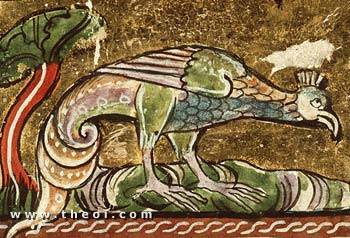BASILISKOS
Greek Name
Βασιλισκος
Βασιλισκοι
Transliteration
Basiliskos, Basilisk
Basiliskoi
Latin Spelling
Basiliscus, Basilisc
Basilisci
Translation
Little King
(dim. of basileus)

THE BALISKOS (Basilisk) was a fabulous North African serpent whose deadly touch and poisonous breath withered plants and killed men.
The creature is later depicted in medieval bestiaries as a serpent-tailed bird.
CLASSICAL LITERATURE QUOTES
Pliny the Elder, Natural History 8. 78 (trans. Rackham) (Roman encyclopedia C1st A.D.) :
"The Basilisk Serpent (Basilisci Serpentis) also has the same power [i.e. to kill by sight like the Catoblepas]. It is a native of the province of Cyrenaica, not more than 12 inches long, and adorned with a bright white marking on the head like a sort of diadem. It routs all snakes with its hiss, and does not move its body forward in manifold coils like other snakes but advancing with its middle raised high. It kills bushes not only by its touch but also by its breath, scorches up grass and bursts rocks. Its effect on other animals is disastrous : it is believed that once one was killed with a spear by a man on horseback and the infection rising through the spear killed not only the rider but also the horse. Yet to a creature so marvellous as this--indeed kings have often wished to see a specimen when safely dead--the venom of weasels is fatal: so fixed is the decree of nature that nothing shall be without its match. They throw the Basilisks (Basilisci) into weasels' holes, which are easily known by the foulness of the ground, and the weasels kill them by their stench and die themselves at the same time, and nature's battle is accomplished."
SOURCES
ROMAN
- Pliny the Elder, Natural History - Latin Encyclopedia C1st A.D.
OTHER SOURCES
Other references not currently quoted here: Hippocrates Epistolai 19, Heliodorus 3.8, Artemidorus Daldianus 4.56, Horapollo 1.1, Democritus Greek Anthology 300.
BIBLIOGRAPHY
A complete bibliography of the translations quoted on this page.